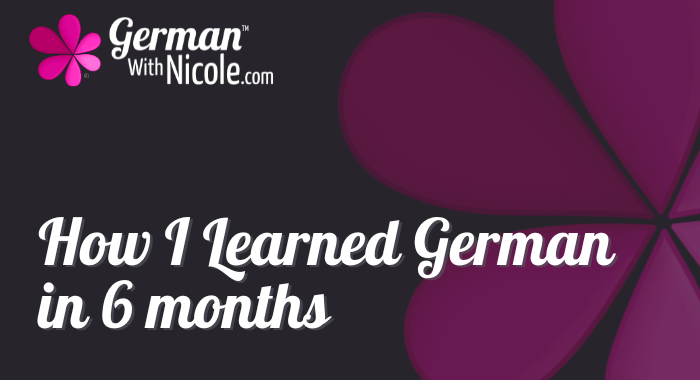How I Learned German in 6 Months

There isn't much of a secret to language learning because it's all about working with the language as much as possible over a length of time. However I can give you tips on how I learned to speak German fluently (and I mean--I could say anything I wanted or needed to say) within about 6 months. Konjunktiv II? Kein Thema. Polite discourse? Absolut! Telling someone off? That, too.
Don't get me wrong--learning German in 6 months was really tough. I started at an A2 level (the second-lowest level) and busted my way up to C2 (the highest level) and I did it without a whole lot of help outside of class hours. It was really difficult, painful, and even joyful and inspiring. Here's how it happened:
My First German Lessons
First, in the summer of 2002 I took 20 one-on-one lessons with a fantastic teacher at Eloquia, a language school in Frankfurt, Germany. I was in Germany without a whole lot to do during the day and to fill up my time, I took lessons and did homework. This teacher was key--because she prepared me in German grammar construction and corrected me by telling me why something was wrong.
Another benefit of these private lessons was that I didn't accidentally learn other peoples' mistakes! All I had to hear was my voice and my teacher's voice--I was immersed in quality language development.
I then reviewed this material when I returned home and used it to help me write emails to friends in Germany, thus repeating what I already knew. So those 20 lessons actually lasted from the summer of 2002 to the summer of 2003.
Months 1-2
Then in the summer of 2003, when I first moved to Germany, I took two month's worth of lessons at the Goethe-Institut Düsseldorf. My classes were worth every penny. I took two intensive courses and the instructor doing the assessments recognized how much I could construct in my mind with only a basic knowledge of German from those 20 private lessons. His name is Herr Fluch and he pulled me into his MIttelstufe course.
There was one problem, though...that summer there was a heat wave in Germany and there was no air conditioning, only a few fans. And I actually panicked when Herr Fluch gave us one particular worksheet...because I had never heard of the N-Deklination before. It was hot, the topics were tough, but the saving grace of the class was, indeed, Herr Fluch.
He filled our minds and our lesson hours with German. We had total immersion every day for 3 1/2 weeks, homework that reinforced our lessons, and he encouraged us to visit the library to use the extra resources. He was also very blunt...I worked really hard on a homework assignment, but I just didn't get it. He reviewed my homework, marked it up with his green pen...and then marked it up some more, said, "Das können Sie besser machen. Schreiben Sie es neu." (You can do that better. Write it again.)
My heart sank, even though I knew he was right. It was just *so hard.* So I went home, I re-wrote the assignment, and turned it in again to only minor corrections. My confidence grew.
Months 3-6
After those two months I moved to Lippstadt, but I didn't have a job yet, I was looking for one, so I had a lot of time on my hands. I developed two particular routines that were assistive in helping me learn German quickly:
1. I watched "Little House on the Prairie" (dubbed in German) every single day for weeks. One of the German cable stations showed it every day at 1 p.m. so I would cook lunch at 12:30, sit down to eat at 1 p.m., and watch the entire episode. I learned phrases, idioms, and regular, every-day German by watching this show! It was brilliant because I had grown up watching the show, so I knew what was going on while experiencing it in German.
So cool!
2. I turned on "EuroNews," a 24-hour news station, and let it run all afternoon. B ecause the news was on a 10-minute loop, I would get the same series of news stories for 2-3 hours at a time, thus increasing the amount of repetitions I had of the same material. This is why I tell my students to repeat as often as possible! So every time I passed through the living room or stood in the kitchen for 10 minutes, I'd hear the same news story. By the end of the afternoon, I could pick out single words that escaped me and look them up in a dictionary.
ecause the news was on a 10-minute loop, I would get the same series of news stories for 2-3 hours at a time, thus increasing the amount of repetitions I had of the same material. This is why I tell my students to repeat as often as possible! So every time I passed through the living room or stood in the kitchen for 10 minutes, I'd hear the same news story. By the end of the afternoon, I could pick out single words that escaped me and look them up in a dictionary.
Then there were the niceties I learned from going to the bakery almost every day. You see, I would only buy enough bread for 1-2 days at a time so I would have an excuse to go to the bakery and come into contact with more Germans. And I tried to go in the afternoon so I could spend 5 minutes chatting with one employee in particular because she was so open to speaking with me. She might have thought she was selling me bread and sweets, but really she was teaching me a lot of German!
By the time I found a job about two months later, I was more settled in German and comfortable, knowing that I could acquire any vocabulary I needed. As I then started teaching English, I could easily set up tutoring appointments with students' parents over the phone and I also found a job teaching voice lessons (I'm a classical singer). Applying for these jobs, interviewing, and beginning the jobs was the final push for me to become fluent in German as it forced me to speak, to get past my comfort zone, and to become successful at expressing myself in German.
*
I had a very unique situation for learning German, an open schedule, and I used it! Boy, did I use it! And as I tell all my German students: you must look for your own opportunity. Here's what I mean:
* If you can work remotely (even for a period of time), create your own opportunity to spend part of your summer in Germany. Pack your suitcases for an extended period of language immersion. Rent out your house online, hire a housekeeper (hello, college student!), or employ professional services to take care of your place while you're away.
* Find unique scheduling opportunities. One of my students ripped the CD from his book to his smart phone so he listens to the materials over and over again during his commute. It's a brilliant way to spend an extra 60 minutes a day on your German learning!
* Make it work for you: if you have an a.m. coffee & blog-reading routine, like I do, sign up for a podcast or RSS feed that automatically feeds you German every morning. I read 3 or 4 specific blogs in the morning like this and I keep on top of topics that matter to me. If you are a B1 or B2-level (Intermediate) German learner, this is a brilliant strategy.
Scroll down to download your free A1-A2-B1 German Sentence Structure Guide!
Categories
- A1 (69)
- A2 (54)
- B1 (46)
- B2 (23)
- C1 (22)
- Deutsch lernen (78)
- Einkaufen (15)
- Essen (12)
- Grammatik (23)
- Hören (14)
- Landeskunde und Kultur (49)
- Lesen (11)
- Musik (5)
- Nachrichten (4)
- Podcast (61)
- Pronunciation (3)
- Schreiben (3)
- Schwäbisch (4)
- Spiele und Spaß (Games and Fun) (12)
- Sprechen (13)
- Vokabeln (39)
- Video (11)
8 comments
Clearly, your course at the Goethe-Institut was a great starting point. Following up thereafter by being exposed in Germany turned good into total fluency. I have no plans to move although I worked in Germany for a number of years. My duties all involved contracts in English. I am almost ready to look at Deutsche Welle. Perhaps in a couple months
Hallo Paul. Ja, in der Tat. Those classes at the Goethe-Institute were tough AND fun. There was also a crazy heat wave that summer, temperatures in the 100s and no air conditioning. We all drank a lot of Apfelschorle (apple juice spritzer). You might be interested in "Introduction to German," which will be an easy-breezy summer class and it's for beginners and people starting German again. Here's the link: https://www.germanwithnicole.com/page/145462
Your German has improved it just because you actually lived in Germany and that’s why you are surrounded by Germans, But it would be difficult the other way around with me because I don’t live in Germany yet I am learning German and it’s really hard to stay on track
Yes, it is difficult when you're not there. So see if you can build a routine into your day/week like that student did with listening to the CDs in the car. Can you listen to something on your phone on the bus/train? Keep it simple: what are three small ways you can practice German consistently? That consistent time with German is what will help you the most.
Hey! Do you know anything about the Goethe - institut in Sydney?
Hi Krystle, That I don't, however they might have a former or current student who'd be happy to chat with you. It's worth asking. Viel Erfolg.
Hi..I would like to learn Deutsch..
Guten Tag. Please check out these pages here:
1. https://www.germanwithnicole.com/learn-german-community
2. https://www.germanwithnicole.com/german-lessons
Leave a comment